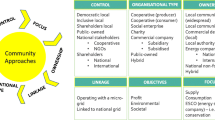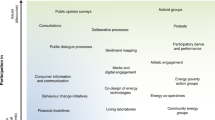Abstract
Sustainable energy systems and transitions towards such systems are often discussed among experts or high-level stakeholders, but rarely involve individuals from the general community. This paper argues that it is important for such stakeholders to be engaged in the visioning or formation of plans for future energy systems in order for effective transitions to take place. The results of a number of related studies and techniques for achieving such visions are presented. Furthermore, research has indicated that there is a need to effectively nurture niche actors in order to provide the seeds of future sustainable regimes with the possibility to emerge. A discussion of how policy could promote this will also be described.
Access this chapter
Tax calculation will be finalised at checkout
Purchases are for personal use only
Similar content being viewed by others
References
Zhang Q et al (2012) Scenario analysis on future electricity supply and demand in Japan. Energy 38(1):376–385
Elliston B, MacGill I, Diesendorf M (2013) Least cost 100% renewable electricity scenarios in the Australian National Electricity Market. Energy Policy 59:270–282
MEJ (2011) Potential for the introduction of renewable energy (FY 2010) [in Japanese]. Ministry of Environment of Japan, Tokyo
National Policy Unit (2012) Options for energy and environment – the energy and environment council decision on 29 Jun 2012. (cited 22nd Aug 2012). Available from: http://www.sentakushi.go.jp/english/
WEC (2007) Transport technologies and policy scenarios to 2050. World Energy Council, London
Beyond Zero Emissions (2010) Zero carbon Australia: stationary energy plan. Melbourne Energy Institute, University of Melbourne, Melbourne
IEA (2013) World energy outlook. (cited 24 May 2013). Available from: http://www.worldenergyoutlook.org/
McLellan BC et al. (2013) Assessing sustainable regional energy systems: a case study of Kansai. In 4th international conference on sustainable future for human security. Kyoto
IEA (2013) Energy balances of OECD countries. International Energy Agency, Paris
Zhang H, Mao Z, Zhang W (2015) Design charrette as methodology for post-disaster participatory reconstruction: observations from a case study in Fukushima, Japan. Sustainability 7(6):6593
Parrish K, Singh R, Chien S-C (2015) The role of international institutional partnerships in delivering low-energy building design: a case study. Sustain Cities Soc 14:383–389
Mathy S, Fink M, Bibas R (2015) Rethinking the role of scenarios: participatory scripting of low-carbon scenarios for France. Energy Policy 77:176–190
Corder GD et al (2012) Engineering-in sustainability through the application of SUSOP®. Chem Eng Res Des 90(1):98–109
McLellan BC et al (2009) Incorporating sustainable development in the design of mineral processing operations – review and analysis of current approaches. J Clean Prod 17(16):1414–1425
Corder GD, McLellan BC, Green SR (2012) Delivering solutions for resource conservation and recycling into project management systems through SUSOP®. Miner Eng 29:47–57
Tuazon D et al (2012) A practical and rigorous approach for the integration of sustainability principles into the decision-making processes at minerals processing operations. Miner Eng 29:65–71
Corder GD, McLellan BC, Green S (2010) Incorporating sustainable development principles into minerals processing design and operation: SUSOP®. Miner Eng 23(3):175–181
Forum for the Future (2011) The five capitals. 2011. (cited 12 Sep 2011). Available from: http://www.forumforthefuture.org/project/five-capitals/overview
MIAC (2015) Japanese government statistics. Ministry of Internal Affairs and Communication, 2015. (cited 23rd Jul 2015). Available from: http://www.stat.go.jp/english/data/index.htm
McLellan BC, Aoki K, Kishita Y (2014) Transitioning to sustainable future energy systems: surveying lock-in. In EcoDesign products and services symposium, Ecodesign Promotion Network: Tokyo
WEC (2010) Survey of world energy resources. World Energy Council, London, p 608
Zhang Q et al (2012) Integration of PV power into future low-carbon smart electricity systems with EV and HP in Kansai Area, Japan. Renew Energy 44:99–108
Esteban M, Portugal-Pereira J (2014) Post-disaster resilience of a 100% renewable energy system in Japan. Energy 68:756–764
Esteban M, Zhang Q, Utama A (2012) Estimation of the energy storage requirement of a future 100% renewable energy system in Japan. Energy Policy 47:22–31
Author information
Authors and Affiliations
Corresponding author
Editor information
Editors and Affiliations
Rights and permissions
Copyright information
© 2017 Springer Japan
About this chapter
Cite this chapter
McLellan, B.C., Kishita, Y., Aoki, K. (2017). Participatory Design as a Tool for Effective Sustainable Energy Transitions. In: Matsumoto, M., Masui, K., Fukushige, S., Kondoh, S. (eds) Sustainability Through Innovation in Product Life Cycle Design. EcoProduction. Springer, Singapore. https://doi.org/10.1007/978-981-10-0471-1_40
Download citation
DOI: https://doi.org/10.1007/978-981-10-0471-1_40
Published:
Publisher Name: Springer, Singapore
Print ISBN: 978-981-10-0469-8
Online ISBN: 978-981-10-0471-1
eBook Packages: Earth and Environmental ScienceEarth and Environmental Science (R0)




